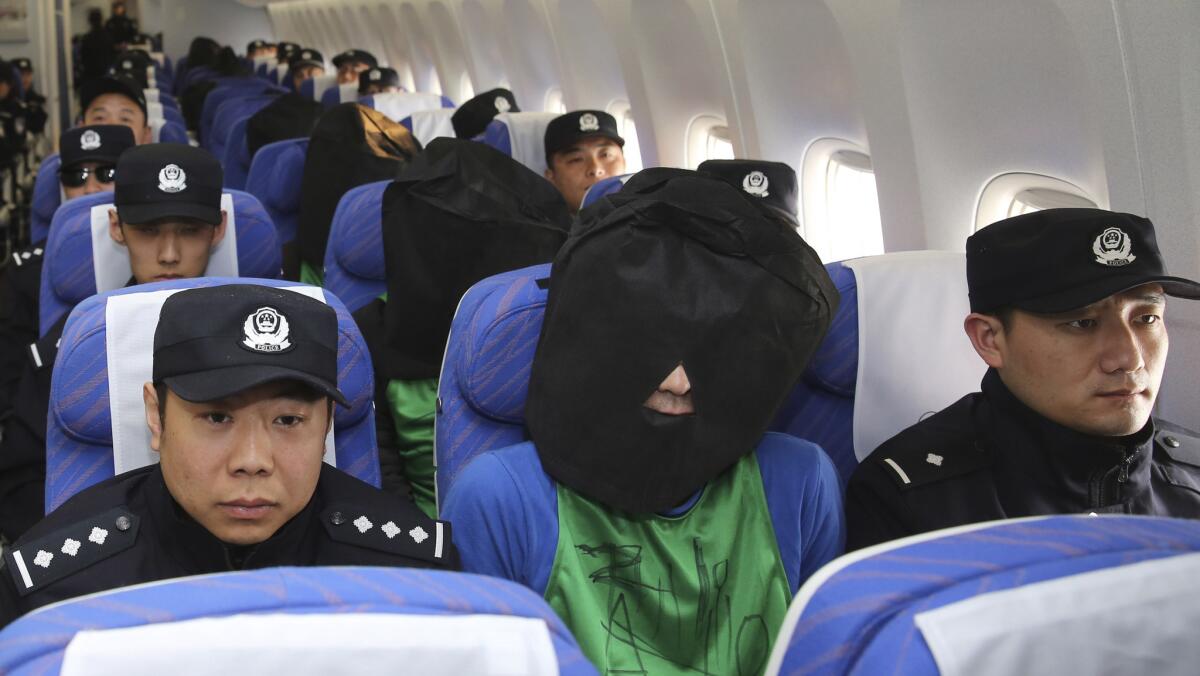China is dialing 911 over Taiwanese phone scammers

China’s Xinhua News Agency released this photo that it said shows Chinese and Taiwanese wire fraud suspects, their heads covered by hoods, arriving at the Beijing airport under police guard after they were extradited from Kenya on April 13, 2016.
Reporting from Taipei, Taiwan — A decade ago, Taiwan’s central police agency set out to crush telephone fraud, which had taken root on the island and was fleecing people of hundreds of millions of dollars a year.
The police claimed ample success, but the silver-tongued swindlers simply expanded offshore, phoning their victims from at least two dozen countries as far flung as Paraguay and Egypt.
Using their fluent Mandarin, they also found a new, deep-pocketed set of marks to bilk out of their savings: increasingly wealthy mainland Chinese.
Now, the hustlers are at the heart of a major international diplomatic brouhaha. Taiwan is suddenly grappling with the surprise deportation of 45 of its citizens from Kenya to China and is racing to keep up with three other deportation cases involving Taiwanese suspects.
“Things have improved a lot in Taiwan because of public awareness work, so they’ve all moved offshore,” Taiwan’s Cabinet spokesman Sun Lih-chyun said. “Cooperation with China and how to handle these matters from now onward, what model we use, that’s what we need to work out.”
Working with mainland China is tricky for Taiwan because the two countries have not recognized each other’s governments for 70 years. The mainland’s communist government considers Taiwan to be part of China; Taiwan views itself as independent.
Political tension is expected to worsen in May when a new Taiwanese president takes office. Lack of cooperation could set off a wave of deportations of Taiwanese suspects from other countries to China, embarrassing officials in the new government and angering the Taiwanese public.
But so far, there are signs that the two sides are working together, if a bit awkwardly.
Fraud in Taiwan took off around 2001. In one scam, criminals posing as government workers would call random numbers and claim that the victim’s national health insurance files had been stolen. They would ask the victim to place their bank savings in a “safe” account, purportedly run by the government, to help solve the case.
In other cases, callers would pretend they had kidnapped a mark’s family member, often a daughter, and ask for ransom. The caller might hire a woman to scream in the background. Fraud losses averaged $1,000 per case.
A public awareness campaign via radio and television, along with a fraud complaint hotline, cut cases from a peak of $575 million in losses in 2006 to one fifth of that last year, police agency section chief Chen Shih-huang said.
But as mainland Chinese people became wealthier, many Taiwanese fraudsters began targeting their money and moving there to recruit local people to make calls.
When police on the mainland started to catch wind of the schemes, the criminal rings moved their telephone and Internet scams to places such as Egypt, Kenya and Southeast Asia, Taiwan’s justice ministry says.
Beijing confronted the issue April 8, when it asked Kenya to deport the first of two groups of suspected Taiwanese telephone fraud perpetrators — not to Taiwan, but to China, after a court in the African country cleared them of charges of unlicensed telecom equipment use. Taiwan branded the move an attempted abduction, but Kenya let China take that first group and another group on April 12, for a total of 45 people. Days later, China tried, unsuccessfully, to get Malaysia to send it 52 Taiwanese wire fraud suspects.
China claims sovereignty over self-ruled Taiwan and can use its diplomatic clout — it has 170 formal allies compared with Taiwan’s 22 — to make other governments treat Taiwanese as Chinese, though they carry different passports.
Taiwan tried to intervene in Kenya but was too late to stop the extraditions.
“We’re quite angry about how China was unilaterally able to [arrange the deportations of] those people to China without even talking to Taiwan first,” says Lai I-chung, vice president of Taiwan Think Tank, which is close to the current opposition party. “It’s critical for both sides to battle these crimes.”
Kenya may be just a start, China has hinted. A map published online by the Communist Party newspaper People’s Daily indicates Taiwanese fraudsters have operated in about 25 countries. Their illicit gains doubled from 2011 to 2015, the paper said.
On April 13, state-run China Central Television reported that Chinese police had cracked a 62-person, $18-million fraud ring in Uganda involving a Taiwanese “chief.” The same week, Indonesian police arrested 31 Taiwanese suspected of Internet fraud in Bali.
China and Taiwan are working together on the Indonesia case, which also netted 11 mainland Chinese suspects, Taiwanese media say. Of the suspects in Malaysia, where Taiwanese authorities intervened quickly, 20 have been returned to Taiwan and the other 32 are due to be sent back, a diplomat said on condition of anonymity.
Taiwan also sent 10 government officials to China in late April to work out ways of cooperating. The two sides agreed to handle the Kenya suspects together and do the same on any new fraud cases, the Taiwan justice ministry said in a statement.
Some analysts say China may also be using the international fraud cases to flex its muscles before Taiwan’s president-elect, Tsai Ing-wen, takes office in May. Her Democratic Progressive Party has been cool toward China, and has been reluctant to embrace the idea that Taiwan and the mainland belong to “One China” — a formulation Beijing insists on for continuing dialogue.
But China might quit trying to have Taiwanese fraud suspects deported to the mainland if Taiwan shows more resolve to stop fraud by its citizens based overseas, other experts say. The 45 suspects in China have confessed, Beijing’s official Xinhua News Agency reported, and a court in Taiwan issued arrest warrants last week for 18 of the 20 who were in Malaysia.
“If cooperation is to the satisfaction of China, then the Chinese government will let other countries send [suspects] back” to Taiwan, said Shane Lee, political scientist at Chang Jung Christian University in Taiwan.
The ultimate snag may lie in Taiwan’s legal system, which requires more evidence to convict than does China’s system, which relies heavily on forced confessions. Fraud convicts in Taiwan sometimes are sentenced to just a year in prison, compared with a maximum of life in China, said Yeh Yu-lan, a retired associate professor from Central Police University in Taiwan.
Evidence can be scarce if the crimes start offshore, with prosecutors depending on authorities overseas to provide information, and those caught are often just “runners” for bosses who know how to stay hidden in Taiwan, Yeh said. Money taken from victims is often quickly laundered.
Yeh lost money to e-commerce fraud in 2001. A suspect in the case got two years in prison, but she never saw her money again.
“One part of the problem is that it’s offshore and another is the people at the top. A lot of them are still in Taiwan,” she said. “The capital comes from them. And then there’s a runners group, a recruitment group. It’s organized crime.”
Jennings is a special correspondent.
More to Read
Sign up for Essential California
The most important California stories and recommendations in your inbox every morning.
You may occasionally receive promotional content from the Los Angeles Times.










